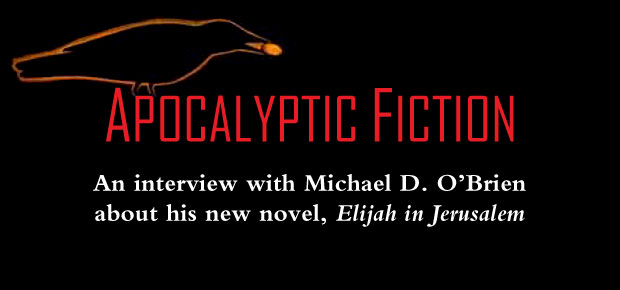Michael D. O’Brien is a best-selling novelist, an insightful social critic, and an acclaimed painter. In 1996 Ignatius Press published his debut novel, Father Elijah: An Apocalypse, a powerful story of a Carmelite priest’s confrontation with the Antichrist. Since then, Ignatius has published ten more of his novels. His writing has been compared to Dostoevsky by Peter Kreeft, and has been praised by the late Sheldon Vanauken, who said of Father Elijah: “I’ve read thousands of books, and this is one of the great ones. I hope tens of thousands read it, and are shaken as I have been.”
It has been nearly twenty years since the publication of Father Elijah. It’s now that we return to the story of Elijah Schäfer: priest, Holocaust survivor, and witness to the end times. Rose Trabbic interviewed Michael O’Brien about the new novel Elijah in Jerusalem for the Ignatius Press Novels blog.
In the preface to Elijah in Jerusalem you wrote, “To presume that we have received in advance a precise decryption of the symbolic prophecies in the book of Revelation – a route map or survivalist manual, as it were – is to weaken our faculty of discernment and our openness to the guidance of the Holy Spirit and the angels.” Why did you feel the need to write this warning in the preface?
O’Brien: World-angst is in the very atmosphere we breathe daily. The apocalyptic sense saturates the consciousness, and subconscious, of contemporary mankind. It manifests in a variety of ways, for example in the tsunami of disaster films and also in the neo-horror films which corrupt the meaning of the supernatural. It’s also visible in the proliferation of people claiming to be mouth-pieces for God. My purpose in writing a cautionary introduction to the novel was mainly to warn believing Christians against this particularly dangerous form of apocalypticism. Because my novel deals with apocalyptic themes in an imaginative way, I did not want any readers treating the story as a kind of “prophetic” foretelling of the future, adding it to the thousand voices proclaiming wildly diverse scenarios of the future.
Do you reject private revelation?
O’Brien: No, I surely do not. However, I maintain that in this field of the spiritual life we must always exercise particularly careful discernment. While I respect private revelation that is tested and approved by legitimate religious authority, I am concerned about the way many deeply devout people have fallen into a kind of neo-gnostic consumption of the locutions of seers and visionaries, indiscriminately, and to the degree that it becomes an insatiable appetite. All too easily this leads to displacing the Gospels and the teachings of the Church with a pseudo-Gospel, an End-Times Gospel. In my novel, both authentic and false private revelations play a role; the authentic consoles and strengthens God’s servants, the false sows confusion among the most devout of the Lord’s followers. Both are indeed present in our times—at the very moment in history when we need to be most united in our resistance to evil.
 In Elijah in Jerusalem, the Antichrist emerges as the world leader, and Father Elijah is sent to rebuke him and call him to repentance. One of the Antichrist’s important platforms is to erase all differences with religions so that there will be peace. Why is this a dangerous and false illusion?
In Elijah in Jerusalem, the Antichrist emerges as the world leader, and Father Elijah is sent to rebuke him and call him to repentance. One of the Antichrist’s important platforms is to erase all differences with religions so that there will be peace. Why is this a dangerous and false illusion?
O’Brien: While it is true that many world religions have portions of the truth, having come to them by intuition or reflection as a fruit of Natural Law written in human nature, the image of God within our nature, the truths are mixed with errors. And even if such religions may point obliquely in the general direction of ultimate Truth, they do not give us Jesus Christ, He whom the Father has sent to mankind as its Savior. There is no eternal salvation outside of him. Thus, any new global religion or world movement that posits the sameness of all religions, with Christianity as just one of many prefiguring myths, is actually leading man away from salvation. It becomes a tool in the hands of the spirit of anti-Christ, and ultimately in the hands of the “Man of Sin” who will be the actual Antichrist.
The novel features many different characters, sinners with very tragic, hidden backgrounds, who encounter Father Elijah. Why does Father Elijah encounter these people? What is your inspiration as you develop these characters, who have such vivid and painful pasts?
O’Brien: As a young man I experienced a few ill-spent years as an agnostic and sometime atheist. I know what it is to view existence through that form of blindness. I have an immense love of people trapped in grievous sin and error, and as I write my novels I’m yearning to tell them their own true story—the real story—of their eternal dignity and value, of God’s love for them. I’m also conscious that the Apocalypse foretold by the prophets and by Christ and the apostles must not be viewed as a purely symbolic mega-drama enacted as high theatre sometime in the safely distant future. When the foretold events actually occur, they will be experienced at ground level by all kinds of people, in a variety of subjective ways. If our times prove to be those prophesied, we too will experience it in our particular personal ways. In every generation, the question should be asked by all those who strive to follow Jesus: Am I awake? Am I spiritually ready? Moreover, how can I reach people who are in extreme spiritual and moral danger, living in unrepented sin and possibly despair? How can I be a faithful message bearer of the redeeming light of Christ, and also be this message in my very being?
On his journey, Father Elijah stays with a community called the “House of Reconciliation.” Do you think that Christians need community like this, especially in modern times? What do you think are the marks of a good Christian community?
O’Brien: Christians surely need community with fellow believers. We are not, neither in our fundamental human nature nor in our temperaments, designed to be isolated units adrift in the cosmos. We are called to be members of the Body of Christ, united in what the early Church called koinonia, which we might describe as the unity of mind, heart and spirit given by the Holy Spirit. Parish life or consecrated religious community life is intended to be the normal way of living this in our times. But during the Apocalyptic era, parishes and other formal communities will be persecuted and scattered. We will have great need of smaller, less formal associations of friendship in Christ. The forms this will take may be quite varied, but common to all will be the Eucharist, prayer, love of the Scriptures, and sacrificial self-giving for others. Caritas and Veritas, love and truth integrated as a single unified whole.
Can you tell us a little bit about the Irish woman that Father Elijah encounters, a false prophet who is earnest, but mixes truth with lies. How can we tell when someone is a false visionary – and guard ourselves from falling into this?
O’Brien: This is a touchy topic, returning us to your previous question about private revelation. The “Irish woman” I refer to is based loosely on a self-proclaimed visionary from that country who has gathered a phenomenally large audience of millions worldwide, with her books in many languages. In her locutions and directives “from heaven”, heresy and imagination combine with beautiful devotional elements, cross-pollinated from other, more authentic people, to make a volatile mix. Again, I emphasize that there are solid sources of private revelations we should be attentive to, indeed some from Irish women who are humble and obedient to their bishops and spiritual directors. And, hey, I’m of Irish extraction too! My main concern in presenting this fictional portrait of false revelation was to remind the faithful that we all need to grow in true discernment. We have been sorely lacking in this regard, and may I say again, we now need right discernment perhaps more than at any other period of history since the first centuries of the Church.
Regarding tools of discernment, there is no easy quick test of authenticity. Unless a revelation contains a glaring heresy or blatant manifestation of egocentric or diabolic influence, it can be difficult to tell. The Father of Lies is the subtlest of creatures. We must keep in mind that even the most moving devotional material from a private revelation source is no guarantee of its authenticity. The Church herself takes pains to assess private revelations carefully and without undue haste. I would suggest a few helpful books in this regard: Dr. Mark Miravalle’s Private Revelation: Discerning With the Church, Fr. Benedict Groeschel’s A Still Small Voice, and Fr. Gabriele Amorth’s An Exorcist Tells His Story.
Are you working on any other novels?
O’Brien: Yes, I’m editing my novel The Fool of New York City, which Ignatius Press hopes to publish in 2016. I’m also far along in writing a novel titled Jakub Koz, set in the Czech Republic, Amsterdam, and California. And I’m beginning the early chapters of a novel titled The Sabbatical, which is about a mild-mannered history professor who helps save the world. A lot of work ahead. As Scripture says, “Of the writing of books there is no end . . .”
—-
Read the first chapter of Elijah in Jerusalem here on the Ignatius Press Novels site.







The Reverend John E. Morrison, III
November 17, 2015 at 5:39 pm
I’m delighted that this was passed on to me by a friend in the New York C. S. Lewis Society. I’ve written on Michael O’Brien, “C. S. Lewis and Michael O’Brien: The Apocalyptic Imagination” and will be publishing a second piece on Lewis and O’Brien and the theme of forgiveness with a special focus on Narnia and Island of the World. It has become a mission of mine to make O’Brien better known this side of the border and I have spoken on him at Immaculate Conception Seminary in Huntington, New York in addition to leading discussions of his works at various churches on Long Island. I consider O’Brien’s Island his best work and one of the truly wonderful pieces of the last 100 years. As Louis Markos said to me some time ago, “The best thing about O’Brien’s work is that it is literature.” There is so much to think about that my copy of Island has no more room for comments in the margins; indeed pages and pages are highlighted so graceful is the writing and compelling the thought. I’m thrilled that more works are in the not so distant future.
John Herreid
November 17, 2015 at 5:57 pm
Rev. Morrison: That’s great! Do you have any of your writings on O’Brien and Lewis available online?
gabriel
November 24, 2015 at 12:30 am
Thank you for your balanced comments on private revelations. Too many otherwise solid thinkers are ready to simply ignore them as too problematic without going into the necessary discernment that can lead to real treasures. The Catholic Church has a glorious heritage of private revelations of great profundity, but many Catholic thinkers seem to be rather indifferent to what is happening in our own times. However, as Benedict XVI pointed out, these prophetic writings (when authentic) are there to guide our actions. To give a simple example, if a private revelation prods someone into finally picking up their rosary, it is already a step in the right direction, though each further step requires discernment in the light of Catholic faith.
Laramie Hirsch
December 5, 2015 at 2:31 am
“While I respect private revelation that is tested and approved by legitimate religious authority, I am concerned about the way many deeply devout people have fallen into a kind of neo-gnostic consumption of the locutions of seers and visionaries, indiscriminately, and to the degree that it becomes an insatiable appetite.”
Do you suppose he is referring to Medugorje devotees and Maria Simms fans?
Catholic World Report-Elijah in Jerusalem ~ Catholic Canada
May 24, 2017 at 3:40 am
[…] Apocalyptic Fiction […]